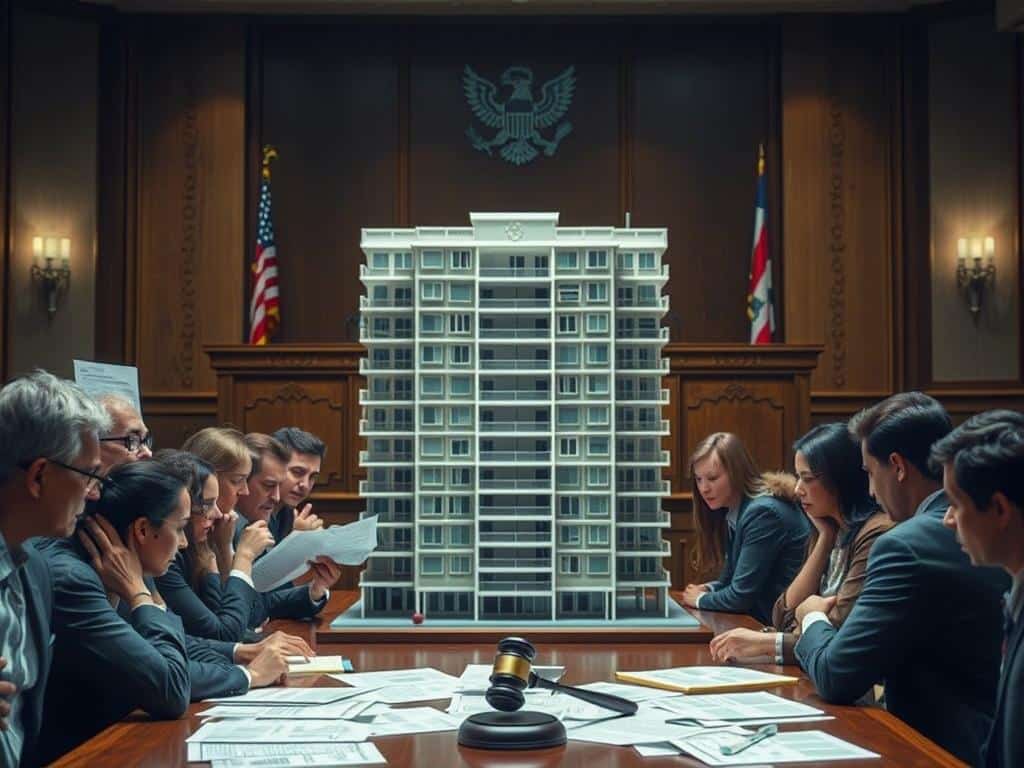Did you know that in 2010, the yogurt brand Dannon was ordered to pay $45 million for false advertising claims related to their Activia brand yogurt? This surprising statistic sheds light on how serious and costly deceptive practices can be. When it comes to your living situation, false advertising by apartment complexes is no less significant and can be grounds for legal action.
False advertising isn’t just limited to consumer goods. In real estate, misleading claims about amenities, safety features, or lease terms can adversely affect tenants. Imagine moving into an apartment promising top-notch security only to find the building lacks proper surveillance systems. Such deceptive practices violate your tenant rights and can be challenged in a court of law.
Suing for false advertising is more common than you might think. Under various consumer protection acts, such as the Colorado Consumer Protection Act, private citizens can take legal action against deceptive practices. In some cases, damages awarded can be three times the actual amount if bad faith is proven. This legal protection applies to tenants who face misleading information about their living conditions.
Consider the case where Wal-Mart paid fines totaling $66,000 in 2014 for false advertising regarding the price of Coca Cola 12-packs. Similarly, apartment complexes can face legal consequences for making false claims. Tenants have successfully won lawsuits for unreturned security deposits and unsafe living conditions, demonstrating the courts’ willingness to side with the consumer when evidence is compelling.
If you’ve experienced deceptive practices by your apartment complex, understanding your legal options is crucial. Navigating small claims court and knowing when to consult a litigation attorney can help you seek the compensation you deserve. Remember, writing a demand letter often serves as a precursor to litigation, allowing you to articulate your grievances effectively.
Understanding False Advertising in Real Estate
False advertising in the real estate sector can create significant issues for renters and buyers alike. Recognizing when you might be a victim of real estate false advertising is crucial in making informed decisions and safeguarding your interests.
What Constitutes False Advertising?
Real estate false advertising encompasses any misleading or deceptive statements made to lure potential renters or buyers. This can involve exaggerations or omissions that distort the true nature of the property. For example, a company claiming to have “over 1,000,000 hourly updated ads” like ApartmentHunterz.com might misrepresent the actuality by listing already rented properties, leading to deceptive real estate practices. Inaccurate statements about amenities, safety, and leasing terms also fall under this category of deception.
Examples of False Advertising in Apartment Complexes
Common misrepresentations in leasing include overstating the quality of amenities or falsifying safety features. Some instances are more blatant, such as the Federal Trade Commission’s allegations against WeTakeSection8.com for listing properties that did not accept Section 8 vouchers, causing severe impacts on low-income consumers forced to act within a narrow window of 60-90 days to find suitable housing. Additionally, there are documented cases where property managers continued to advertise already rented units. Understanding these patterns and recognizing deceptive real estate practices can help protect you from falling victim to such scams.
In the real estate market, misrepresented amenities or falsely advertised services are more than just disappointments—they can lead to significant financial and emotional distress. Such infractions violate trust and consumer rights, and knowing how to identify and combat these practices is an essential part of navigating today’s complex rental market successfully.
Legal Grounds for Suing an Apartment Complex
Understanding the legal grounds for suing an apartment complex is essential to ensure that tenants are well-equipped to protect their rights. Various federal and state laws provide the necessary framework for these protections.
Applicable Federal and State Laws
Tenants can pursue legal action against apartment complexes based on violations of federal housing laws and state consumer protection laws. For instance, the Fair Housing Act is a pivotal federal statute designed to prevent discrimination and ensure fair treatment for all tenants.
At the state level, consumer protection laws offer additional safeguards. These laws demand that landlords properly handle security deposits, maintain the habitability of rental properties, and disclose any material defects, such as lead-based paint hazards.
Consumer Protection Acts and Their Relevance
The Consumer Protection Act (CPA) plays a crucial role in defending tenants from deceitful practices. For example, the CPA in Maryland specifically prohibits landlords from making false or misleading statements about a property’s characteristics, standard, or quality. Such “unfair and deceptive practices” are grounds for apartment complex litigation.

If a landlord actively engages in prohibited deceptive practices, tenants have the right to file a complaint with the Division of Consumer Protection. Furthermore, legal actions under the CPA can result in landlords facing civil penalties of up to $10,000, escalating to $25,000 for subsequent infringements, along with possible recovery of losses for the tenants.
| Violation Type | Legal Consequence |
|---|---|
| Making false statements | Civil penalties up to $10,000 |
| Failing to disclose defects | Tenant may recover losses |
| Repeated violations | Penalties up to $25,000 |
Approximately 5% of renters in urban areas consider legal action against landlords each year for various reasons, including the failure to maintain the property and unlawful eviction. When pursuing legal grounds, tenants should carefully review lease agreements, gather supporting evidence, and if necessary, seek mediation or file lawsuits to ensure their rights are upheld.
Common Examples of False Advertising by Apartment Complexes
Misleading advertising is a common issue faced by prospective renters and can have significant financial and emotional ramifications. Understanding how apartment complexes may engage in misleading practices helps tenants make informed decisions. Below are common examples of these deceptive tactics.
Misrepresentation of Amenities and Services
One prevalent issue is misleading amenities advertising. Apartment complexes might advertise facilities like swimming pools, fitness centers, or rooftop gardens that either do not exist or are under long-term renovation. This misrepresentation can mislead tenants who may have prioritized these amenities when choosing their new home.
Falsification of Safety and Security Features
False security features are another critical concern. Complexes may tout state-of-the-art security systems, gated entrances, or 24/7 security patrols that are either minimal or non-existent. This false sense of security can put residents at risk, making it a serious issue of concern.
Deceptive Pricing and Lease Terms
Deceptive lease advertising is also common, particularly with pricing and terms. Some leases include hidden fees or obscure clauses that differ from what was initially advertised. This could involve additional charges for amenities, unexpected rent hikes, or unfavorable lease terms that were not clearly stated upfront.
Potential renters should be vigilant and scrutinize all advertised claims to avoid falling victim to these deceptive practices. Documenting any misleading advertising can be crucial when challenging these issues legally. Below is a table illustrating some of the most common deceptive advertising practices and their potential impact on tenants.
| Type of Misleading Advertising | Common Practices | Potential Impact on Tenants |
|---|---|---|
| Misleading Amenities Advertising | Falsely advertised fitness centers, pools, or other facilities | Disappointment and frustration, financial loss, false expectations |
| False Security Features | Non-existent security patrols, fake surveillance systems | Increased risk to personal safety and property, false sense of security |
| Deceptive Lease Advertising | Hidden fees, undisclosed clauses, sudden rent increases | Unanticipated financial burden, legal disputes, violation of tenant rights |
Recognizing these common deceptive practices can help you navigate and mitigate the consequences of false advertising in apartment complexes.
Steps to Take Before Filing a Lawsuit
Before you prepare to sue an apartment complex for false advertising, it is crucial to follow essential legal steps before lawsuit. Initially, you should draft a demand letter that clearly outlines your grievances and the specific compensation you are seeking. This is a critical step in demand letter creation, as it can sometimes resolve issues without needing to proceed to court.

Understanding the legal obligations of the landlord and knowing your rights as a tenant is also fundamental. Gather all pertinent evidence, such as contracts, photographs, communication records, and witness statements. Consulting with a knowledgeable attorney who specializes in tenant rights can provide invaluable guidance in your preparation strategy.
The Fair Housing Act requires allegations to be filed within one year of the discriminatory action, but early filing is recommended. HUD can assist by investigating the matter and potentially referring it to other agencies or Fair Housing Assistance Program partners. Ensure your complaint includes a detailed timeline of events, the location where events transpired, any witnesses, and relevant documents that support your case.
- Draft a detailed demand letter before creating the lawsuit.
- Gather all relevant evidence and documents.
- Understand your tenant rights and landlord obligations.
- Consult with a specialized attorney.
If a mutual resolution through an agreement is impossible, taking legal action becomes necessary. Allegations can be voluntarily resolved at any stage, but HUD may issue a Determination of Reasonable Cause or No Reasonable Cause based on their findings. Additionally, you may file a private civil lawsuit within two years of the most recent discriminatory action, ensuring that all procedural formalities are correctly managed.
| Action | Deadline |
|---|---|
| File Allegations under Fair Housing Act | Within one year of the last discrimination date |
| File Private Civil Lawsuit | Within two years of the latest discriminatory action |
Can You Sue An Apartment Complex For False Advertising?
False advertising by apartment complexes can significantly mislead consumers, often prompting them to make rental decisions based on inaccurate information. Tenants who find themselves victims of deceptive marketing practices may be able to take legal action against the apartment complex. Understanding the requirements to prove false advertising, the process of filing a small claims lawsuit, and the possible outcomes of such legal pursuits can be crucial in winning against false advertising.
Requirements to Prove False Advertising
To successfully sue an apartment complex for false advertising, tenants must establish that the complex made false or misleading claims that influenced their decision to lease. Documenting these claims can be essential. Collecting advertising materials, photographs, and witness testimonials can aid in proving false advertising. Additionally, tenants should be prepared to demonstrate how these misleading claims caused financial losses.
How to File a Small Claims Lawsuit
Filing in small claims court can be an effective method for tenants seeking compensation without large legal fees. Small claims courts generally handle cases involving lower monetary amounts in a straightforward manner. To initiate a lawsuit, tenants should:
- Gather and organize all relevant evidence.
- Visit the local small claims court to file the necessary paperwork.
- Serve the apartment complex with the lawsuit notice.
- Prepare a compelling argument to present in court.
For an informative guide about proving deceptive practices, consider checking out this resource on false advertising claims.
Possible Outcomes of Successful Lawsuits
If the court rules in favor of the tenant, various outcomes are possible. Tenants might receive reimbursements for the damages suffered, court costs, and in some cases, additional penalties if the apartment complex is found to act in bad faith. Below are notable examples of successful lawsuits in small claims courts:
| Location | Compensation Awarded | Court Costs Awarded |
|---|---|---|
| Los Angeles | $3,550 | $75 |
| Los Angeles | $1,500 | $150 |
| Riverside | $1,600 | $135 |
Each lawsuit varies, and outcomes are highly dependent on the specifics of the case and the quality of evidence presented. Personalized legal advice and consulting a tenants’ rights lawyer can further enhance the likelihood of winning against false advertising, helping tenants reclaim their losses and ensure justice.
Additional Legal Resources and Support
When navigating the complexities of false advertising in apartment complexes, it’s crucial to understand the legal resources and support available to you. Consulting with a tenants’ rights attorney and utilizing various government and non-profit resources can provide invaluable assistance throughout this process.
Consulting with a Tenants’ Rights Lawyer
Securing the services of a tenants’ rights attorney can significantly bolster your case, especially in intricate legal matters involving false advertising, unsafe living conditions, or wrongful eviction. A specialized lawyer can offer expert advice, draft legal documents, and represent you in court if necessary. Tenants’ rights attorneys are well-versed in both federal and state laws, including the Fair Housing Act and various consumer protection acts. Their expertise can help you identify the best course of action and improve your chances of a favorable outcome.
Utilizing Government and Non-Profit Resources
In addition to legal representation, several government tenant resources and non-profit legal support services are available to assist tenants. Organizations such as the U.S. Department of Housing and Urban Development (HUD) provide educational materials and mediation services to help resolve disputes. State and local consumer protection agencies can also offer mediation services and facilitate communication with landlords. Moreover, numerous non-profit organizations run legal clinics that offer free consultations and workshops on tenants’ rights. Leveraging these resources can be a game-changer, enabling you to navigate the complexities of landlord-tenant law with greater confidence and clarity.
By consulting with a tenants’ rights attorney and tapping into government tenant resources and non-profit legal support, you can significantly enhance your ability to address false advertising and other related concerns. This comprehensive approach ensures you are well-prepared to protect your rights and pursue justice effectively.
Conclusion
The possibility of taking legal action against an apartment complex for false advertising is not only real but also a significant means for tenants to defend their rights. Issues like misrepresentation of amenities, falsification of safety features, and deceptive pricing are examples where legal recourse is highly warranted. The lawsuit involving 460 apartments, where plaintiffs sought $15,000,000 for false advertising and habitability issues, underscores the importance of holding landlords accountable.
Understanding the legal landscape, including federal and state laws, is paramount. For instance, tenants in all states except Arkansas can sue for uninhabitable living conditions. This empowers tenants to take decisive steps against landlords who fail to meet their advertised commitments. One plaintiff in a recent case paid a $1,175 deposit only to have $586.52 unreasonably withheld, highlighting the necessity for tenant empowerment in seeking restitution.
Before filing a lawsuit, being well-prepared is crucial. Tenants should document false advertising claims meticulously and leverage additional legal resources, such as consulting a tenants’ rights lawyer or utilizing government supports. By doing so, they can increase their chances of successful outcomes. With informed action, the legal system serves as a robust tool for tenants to hold landlords accountable and ensure justice against deceptive practices.








